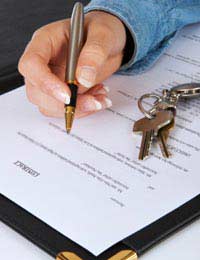Property Management Contracts

When you buy a flat, maisonette or other leasehold property you are in essence buying the sole right to occupy that property for a specified period of time. After the expiry of this period the property will revert to the landlord, known as the freeholder. The document that governs the relationship between you and the freeholder is the lease. It is very important that you understand the requirements of the lease as well as making investigations into the company that manages the affairs of the freeholder. Early recognition of potential problems can avoid considerable headaches later on.
It is obviously important to check the length of time left on the lease. If the remaining term falls below a certain threshold, as well as having a considerable impact on value, it can be difficult to secure a mortgage. However it is possible to extend your lease but there is an obvious additional cost associated with this.
Ongoing Costs
Before exchanging contracts it is very important that you or your solicitor has read and understood the lease. This will enable you to make an informed decision about the potential purchase. There are often charges and fees payable in connection with the lease such as a service charge, ground rent or a managing agent fee.Often the managing agent is not the same company or individual as the landlord. Ground rent may be described as a ‘peppercorn’ or a small amount of money, e.g. £10 per annum. It is vital that you take into account these fees before purchasing the property, and also to bear in mind that these fees can be subject to review and rate increases. If as the leaseholder you fail to pay these charges, the landlord can as a last resort repossess the property. On occasion, there are also other terms contained in the lease such as ‘no pets allowed’ or ‘no parking on the grass’.
Your Responsibilities
A standard lease will make you, the leaseholder, responsible for everything within the four walls of the property – including the floorboards, ceiling and plaster. However this does not usually include structural or external walls as the landlord is usually liable for the building’s repairs and maintenance.Questions To Ask
Before exchanging contracts on a leasehold property, make sure you know the answers to these questions:- What is the cost of the service charge each year?
- When is the amount payable due for review?
- Do leaseholders pay money into a fund to help pay for repairs?
- For which parts of the building are all leaseholders responsible?
- What is included in the insurance policy for the building?
Make enquiries as to the residents committee and if possible speak to current or past residents to get an idea of the situation. It is not uncommon for residents committees to have major disputes with managing agents, although there are many managing agents that are highly proactive and efficient.
- Tenancy Agreements and Deposits
- Title Deeds: Who Keeps Them?
- How Property Contracts Affect You
- What is a Mortgage Contract?
- Equity Release Contracts
- Commercial Lease Agreements
- Housing Association Contracts
- How a Landlord Agreement Works
- When Can a Landlord Rightfully Evict Someone?
- Understanding Your Student Housing Contract
- Tenancy Contracts Explained

Re: Trust and Contracts
written on the parchment was scratched out
Re: Trust and Contracts
written on the parchment was scratched out
Re: Title Deeds: Who Keeps Them?
My dad passed away 4 years ago couldn’t find deeds to house or will even deeds to the grave my brother lives there refused to buy…
Re: Marriage Contracts
Honestly, am not sure of this site, But, really need UK, US, Canadian woman, Am 41yrs of age, +2348110780336 Thank u
Re: Marriage Contracts
I’m looking for a someone who makes me her world. I’m from Bangladesh. I’m 22years old. I’m live in stoke on trent,leek uk.
Re: Marriage Contracts
I want to see marrie in my contact i am single whatssap number +92 03110331553
Re: Marriage Contracts
IGNORE COMMENTS! ((((ALL INDIANS SEE)))) Property Rights Under the law of marriage contracts a spouse has the right to live in the…
Re: Marriage Contracts
Regarding the comments please ignore them (SCAM) Just marry me im a judge, 07538577290. Male - 28 Single.
Re: Contracts and Self Employment
I am self employed and have a contract my contract states my name and the word "employee" in every section. It has headings…
Re: Marriage Contracts
I'm Pakistani my age 26 i need a gril in UK with contract marriage but I am very poor people My WhatsApp+923052150964